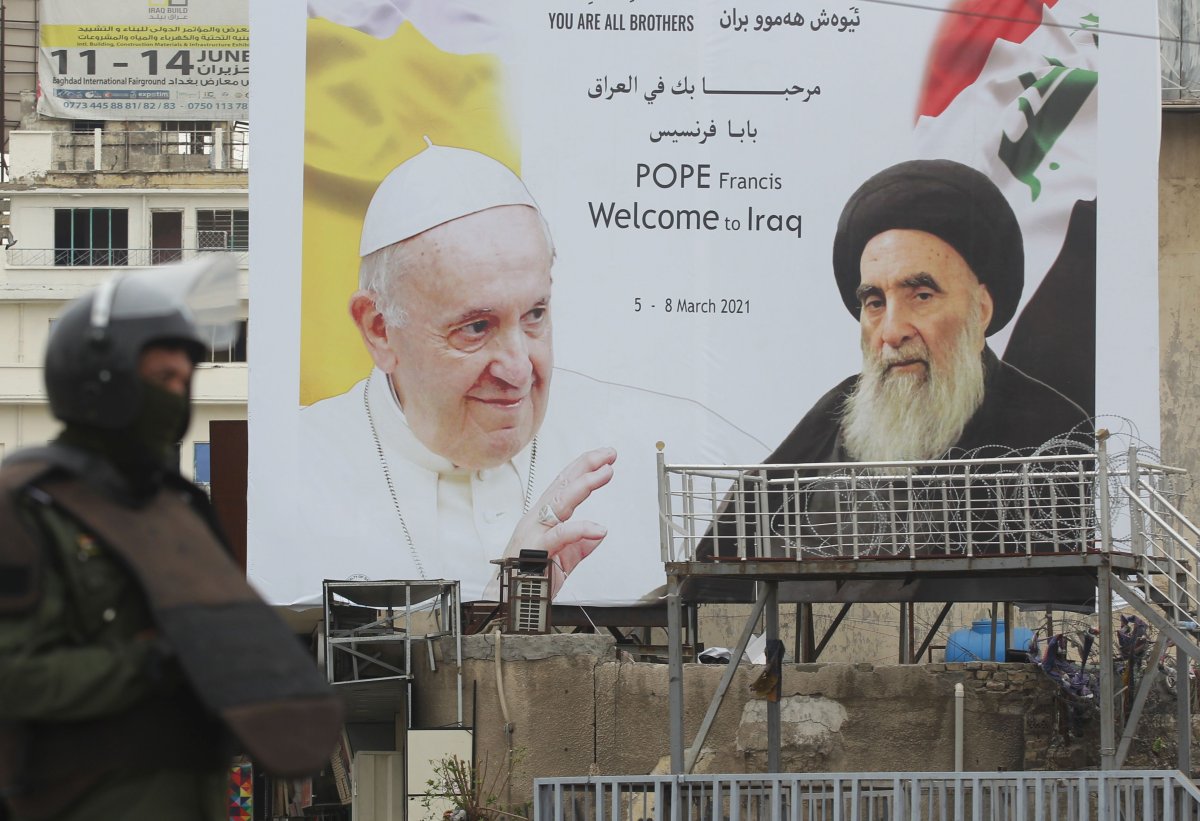The unprecedented visit by 84-year-old Pope Francis to Iraq is significant for many reasons.
It is a celebration of the defeat of ISIS, also known as Daesh. It is a recognition of the Iraqi people's resilient spirit. It is also a reminder of Iraq's 1400-year history of Muslim-Christian coexistence.
One of the most notable parts of the Pope's trip was meeting senior Shiite scholar Grand Ayatollah Ali al Sistani in the Iraqi city of Najaf.
I have personally accompanied U.S. and U.K. delegations to meet with the Ayatollah since 2015. I know that although they are habitually camera shy, Iraq's Shiite clerics have strengthened civil society, bolstered multiculturalism and defeated Daesh.
The world owes them more recognition—and to understand that their tradition, worldview and policies are not at odds with Western values.
"Ayatollah" is not always synonymous with the caricatures present in many Western minds.
Iraq is a Shiite-majority country. Any visit to Iraq is a visit to the heartland of Shiite Islam. By visiting the "Shiite capital" Najaf, the resting place of Imam Ali, the Pope is reaching out to an often invisible but significant school of thought for Islam.
This meeting should be the beginning of shedding more light on the positive role religious leaders like Ayatollah Sistani play in the region.
Recognition is in the interests of Shiite Muslims (and all Muslims who want the world to understand their faith as one of moderation and peace). It is also in the interests of Christian minorities in Iraq, since it is Shiite leaders who have been pivotal in transitioning the country to a "civil state" in post-Saddam Hussein society–an idea that the Ayatollah has long promoted.
Under Ba'athist rule, Christian schools were nationalized and a law passed dictating that the religion's history could be taught in state schools only if at least a quarter of the pupils were Christian. This systemic sidelining of religious minorities was something that both Shiite and Christian Iraqis suffered–and the solidarity it bred outlasted its former dictator.
This solidarity was crucial in the fight against Daesh, whose recruits forced thousands of Christians, who are indigenous, ethnic Assyrians, to flee their homes, convert to Islam or face death.
The historic meeting between the Pope and the Ayatollah is a glimpse into the future of the Middle East, one that puts spirituality and social justice above politics and sectarianism.

Although there is no papacy in Islam, Grand Ayatollah al Sistani is the closest thing Muslims have to a pontiff. There are over 300 million Shiite Muslims worldwide, most of which follow the Grand Ayatollah, despite him holding no political office and dedicating himself to a simple life of learning and teaching.
Although Sistani has been ranked as one of the world's most influential Muslims and was nominated—by a group of exiled Christians of Iraq—for the Nobel Peace Prize in 2014, he keeps a remarkably low profile. Often, so does the community he represents.
This representation has been a lifeline for peace and stability in the region.
On June, 13, 2014, the Ayatollah delivered the famous "wajib al-kifai" fatwa (religious ruling on "collective obligation").
The Iraqi army had just collapsed after being defeated by Daesh in Mosul. The extremists were poised to march on Baghdad and destabilize the region and the world.
It was this fatwa that led to the creation of thousands of volunteers who became known as the Popular Mobilization Forces, who ultimately provided the boots on the ground to retake territory from Daesh.
Although the history books may give more space to Coalition forces or the Kurdish peshmerga, the true turning point of the war against Daesh was when one man in Najaf wrote that "the responsibility for confronting and fighting [the terrorists] is the responsibility of all, not of one sect or one party alone."
This was not an aberration; Iraq's Shiite Muslims, led by Sistani, have long been committed to coexistence and social justice, not supremacism and extremism.
The roots of Shiite apolitical work toward civil rights–and especially minority rights–run deep through Islam's history. Whereas some groups within Islam may have campaigned with military might and worldly power that propelled Muslim empires to imperial greatness, Shiite history is characterized by a quiet, principled movement aimed at protecting human rights against the excesses of power.
The Shiite see themselves as guardians of the Prophet Muhammad's message–one embedded in moderation, coexistence and peace.
This is why Shiite Islam, including Sistani and his millions of followers around the world, are so important to the future of coexistence in the Middle East and across the world.
Just as Sistani's edict seven years ago was a turning point in the fight against Daesh, his hosting of the Pope could be a new page in Christian-Muslim relations.
I hope the eyes of the world can see that.
Jalal Moughania is a lawyer, lecturer and researcher. He is the co-author of "The Pope Meets the Ayatollah: An Introduction to Shi'a Islam."
The views expressed in this article are the writer's own.
Uncommon Knowledge
Newsweek is committed to challenging conventional wisdom and finding connections in the search for common ground.
Newsweek is committed to challenging conventional wisdom and finding connections in the search for common ground.
About the writer
To read how Newsweek uses AI as a newsroom tool, Click here.






